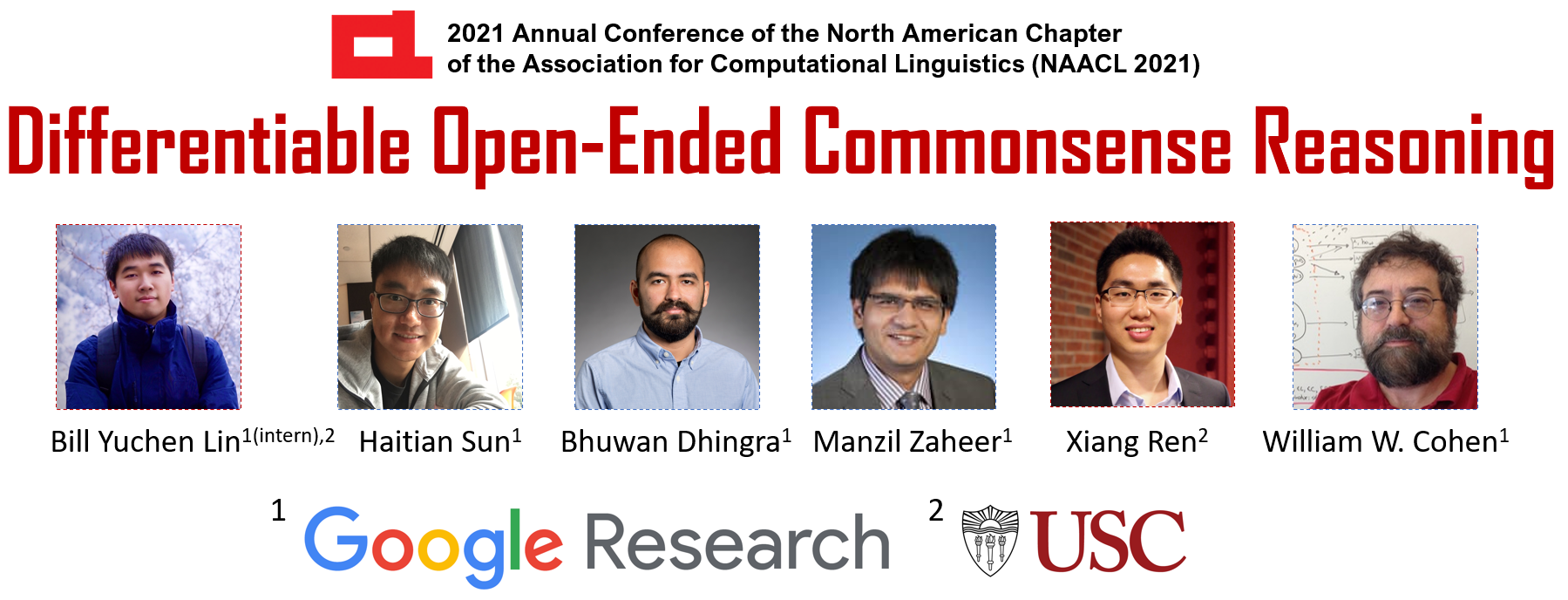Quick links: [Paper] [Video] [Slides] [Documentation]
This is the repository of the paper, Differentiable Open-Ended Commonsense Reasoning, by Bill Yuchen Lin, Haitian Sun, Bhuwan Dhingra, Manzil Zaheer, Xiang Ren, and William W. Cohen, in Proc. of NAACL 2021.
Current commonsense reasoning research focuses on developing models that use commonsense knowledge to answer multiple-choice questions. However, systems designed to answer multiple-choice questions may not be useful in applications that do not provide a small list of candidate answers to choose from. As a step towards making commonsense reasoning research more realistic, we propose to study open-ended commonsense reasoning (OpenCSR) — the task of answering a commonsense question without any pre-defined choices — using as a resource only a corpus of commonsense facts. OpenCSR is challenging due to a large decision space, and because many questions require implicit multi-hop reasoning. As an approach to OpenCSR, we propose DrFact, an efficient Differentiable model for multi-hop Reasoning over knowledge Facts. To evaluate OpenCSR methods, we adapt several popular commonsense reasoning benchmarks, and collect multiple new answers for each test question via crowd-sourcing. Experiments show that DrFact outperforms strong baseline methods by a large margin.
Please check the documentation for running the code.
We show the instructions for running four retrieval approaches to the OpenCSR task — BM25 (off-the-shelf), DPR (EMNLP2020), DrKIT (ICLR 2020) and DrFact (ours, NAACL 2021), as well as a concept re-ranker to boost the performance by learning with cross-attention. Note that there is a relative dependency of these four methods:
- training the DPR model needs the results from BM25 (to create training data);
- DrFact needs to reuse DPR’s fact index and single-hop results (for creating distant supervision);
- DrFact and DrKIT share many utility functions (sparse matrix operation and indexing scripts). We detailed the detailed instructions in individual pages.
- drfact_data/
- datasets/ (download from here)
- knowledge_corpus/ (download from here)
- baseline_methods/
- BM25/ --> https://open-csr.github.io/methods/bm25
- DPR/ --> https://open-csr.github.io/methods/dpr
- MCQA/ (i.e., Concept Re-ranker) --> https://open-csr.github.io/methods/reranker
- language-master/language/labs/
- scripts/
- evaluation/ --> https://open-csr.github.io/evaluation
@inproceedings{lin-etal-2021-differentiable,
title = "Differentiable Open-Ended Commonsense Reasoning",
author = "Lin, Bill Yuchen and Sun, Haitian and Dhingra, Bhuwan and Zaheer, Manzil and Ren, Xiang and Cohen, William",
booktitle = "Proceedings of the 2021 Conference of the North American Chapter of the Association for Computational Linguistics: Human Language Technologies",
month = jun,
year = "2021",
address = "Online",
publisher = "Association for Computational Linguistics",
url = "https://www.aclweb.org/anthology/2021.naacl-main.366",
pages = "4611--4625"
}Note: this is not an official Google product.
This repo is now under active development, and there may be issues caused by refactoring code. Please email [email protected] if you have any questions.

